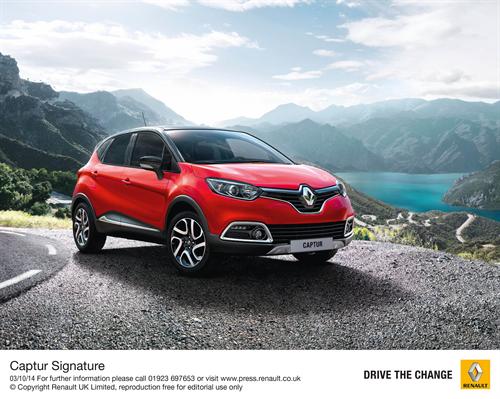 Captur line-up gets new top-of-the-range trim level
Captur line-up gets new top-of-the-range trim level- Adds extras including part-leather upholstery, R-Link infotainment system and rear parking camera
- Choice of petrol and diesel engines
- Returns up to 78.5mpg and emissions as low as 95g/km
- Captur Signature priced from £17,495 OTR
- Available to order now
Renault has introduced a new top-of-the-range trim level to its popular Captur compact-crossover – Captur Signature. This high specification model builds on the Dynamique S MediaNav version and adds numerous extras, including some exclusive ones, as standard. Order books have now opened with prices for Captur Signature starting from £17,495.
On the exterior, 17-inch Explore alloy wheels with black inserts and chrome exterior details on the side strips, boot lid, front grille and fog lights set the Signature trim level apart. A two-tone exterior finish is standard whilst a distinctive optional Flame Red metallic paint is available. A choice of three other metallic and two solid colours is also available.
On the interior, Captur Signature receives upgrades in the form of part-leather upholstery, Signature door sill plates and mats and the Red Touch Pack – adding bright red detail to the centre console, speakers and air vents.
In terms of technology, the Captur Signature represents a step up from the Dynamique S MediaNav trim. The R-Link infotainment system includes a 7-inch touchscreen, satellite navigation (with EU mapping and TomTom LIVE traffic services), USB connectivity and an uprated 4 x 35W Arkamys radio with 3D sound. A rear parking camera combines with the rear parking sensors to make parking effortless. The Grip Xtend advanced traction control system provides maximum grip on the road in difficult driving conditions through the use of a simple thumbwheel on the centre console.
Captur Signature retains the comprehensive specification from the rest of the Captur range with equipment such as electric folding door mirrors, automatic climate control, rear parking sensors, tinted rear windows and tailgate, Bluetooth connectivity and LED daytime running lights.
Captur Signature is available with a choice of two petrol and diesel engines. The petrol line-up consists of a 0.9-litre TCe 90, mated to a five-speed manual transmission, and a 1.2-litre TCe 120, which comes with a six-speed, dual-clutch automatic gearbox. In terms of diesel, the 1.5-litre dCi 90 is available as both a manual and an automatic. On the ENERGY dCi 90 version, emissions are as low as 95g/km whilst fuel economy on the official combined cycle is 78.5mpg – meaning low running costs and free Road Fund Licence.
| Version | VED Band | CO2 (g/km) | MPG (combined) | 0-62mph (secs) | Top speed (mph) | Insurance group | Price |
| Captur Signature ENERGY TCe 90 Stop & Start | C | 115 | 56.5 | 13 | 106 | 9E | £17,495 |
| Captur Signature ENERGY dCi 90 Stop & Start | A | 95 | 78.5 | 13.1 | 106 | 12E | £18,895 |
| Captur Signature TCe 120 Auto EDC | D | 125 | 52.3 | 10.9 | 119 | 14E | £19,695 |
| Captur Signature dCi 90 Auto EDC | B | 103 | 72.4 | 13.5 | 106 | 12E | £19,895 |
Every new Captur is covered by a four year/100,000 miles warranty, as well as four years roadside assistance. Four years/48,000 miles free servicing is available to customers purchasing their new vehicle on a Renault Selections PCP Finance package. Servicing is required every one year/18,000 miles.
The Renault Captur range, which is priced from £14,195, has proved popular with UK motorists since its launch in May 2013 with over 21,000 of the compact-crossovers finding new homes – over 15,000 of these have been sold so far in 2014, making it Renault’s second best-selling model in the UK.

You must be logged in to post a comment.